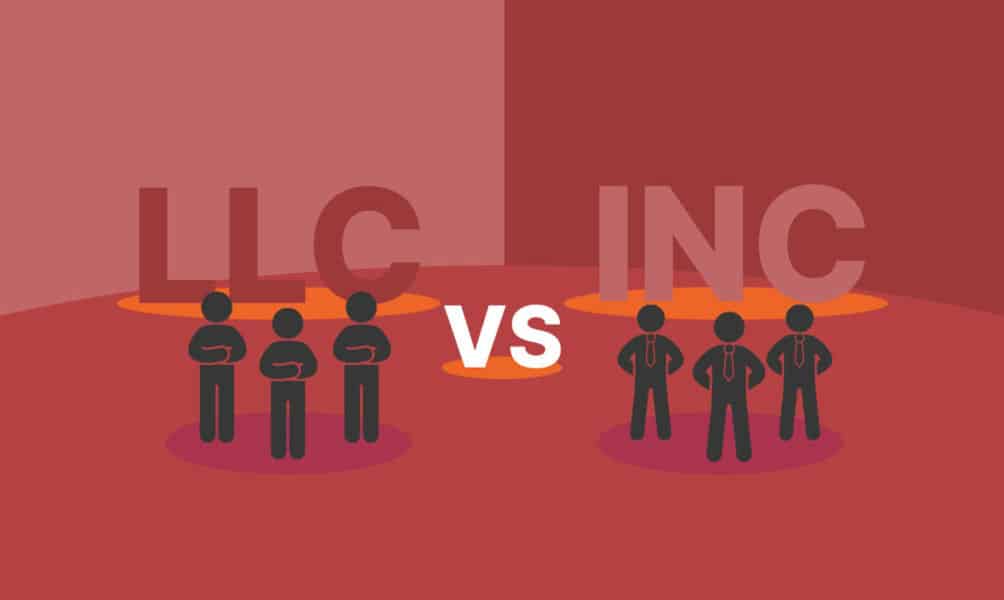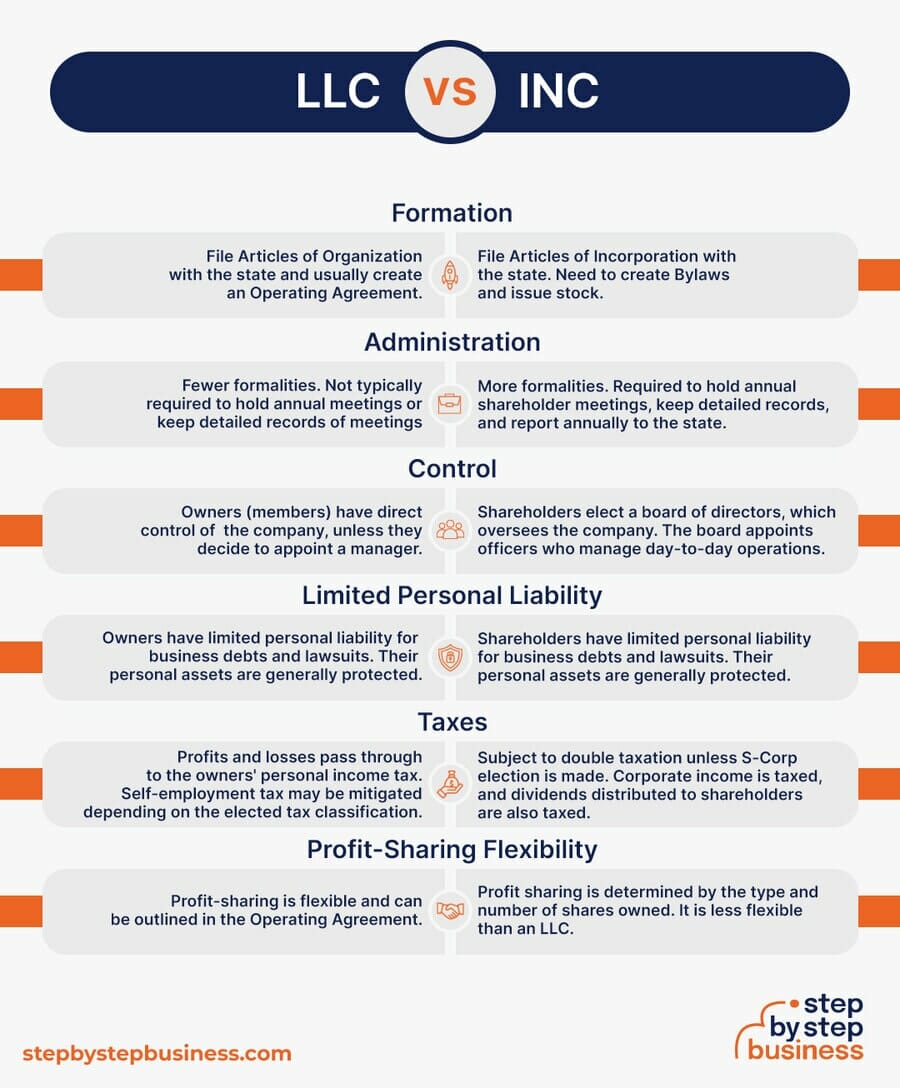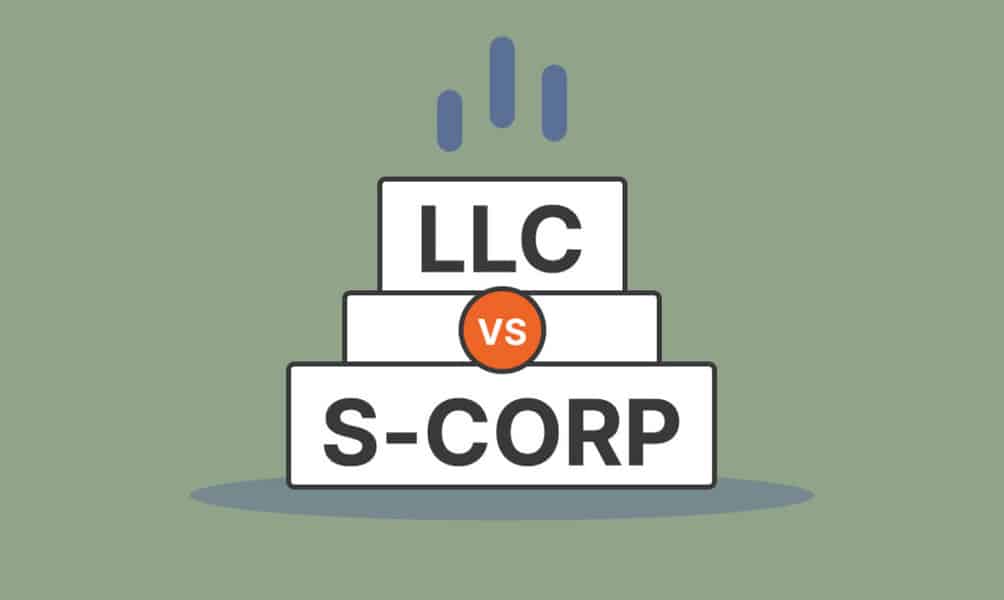If you’re starting an LLC, the business entity formation process is one of the first and most important hurdles. This step can be terribly complex ...
LLC vs. Inc (Corporation): Key Differences
Written by: Carolyn Young
Carolyn Young is a business writer who focuses on entrepreneurial concepts and the business formation. She has over 25 years of experience in business roles, and has authored several entrepreneurship textbooks.
Edited by: David Lepeska
David has been writing and learning about business, finance and globalization for a quarter-century, starting with a small New York consulting firm in the 1990s.
Published on January 12, 2022

When starting a company, deciding which business entity to form is a crucial consideration. Two of the most popular options are a limited liability company (LLC) and a corporation, and you should be aware of the advantages and disadvantages of each before making your choice.

What is an LLC?
An LLC is an increasingly popular business structure for startups, offering liability protection for ownership and greater flexibility than a corporation, particularly in terms of taxes. The LLC itself does not pay taxes. As a “pass-through” entity, income passes through the business to the owner or owners, who report it on their personal tax returns. An LLC is created by filing paperwork with your state, and nominal fees are involved.
An LLC offers its owner or owners, who are called members, considerable flexibility in terms of management. You can choose your management and operational structure and decide how you want to be taxed. Your LLC can have a single member or multiple members, all of whom have personal liability protection, meaning your personal assets are not at risk if you cannot pay business debts or are involved in a lawsuit.
What Is a Corporation?
A corporation is a legal business entity that is separate from its owners. Corporations, like individuals, can enter into contracts, pay taxes, hire employees, be involved in legal action, loan or borrow money, and own assets. Corporations offer personal liability protection for their shareholders, and shareholders benefit from the profits of the corporation.
A corporation is created when it is incorporated by a single shareholder or group of shareholders who have ownership of the corporation in the form of common stock. A corporation can be for-profit or non-profit. Shareholders pay money for the common stock but have no further financial responsibilities to the company.
A corporation must have a board of directors, which is responsible for implementing and executing the company’s business plan. The board of directors is elected by the shareholders. A corporation pays taxes on its profits, and shareholders pay taxes on their dividends, which is sometimes referred to as “double taxation.”
LLC vs. Corporation
Let’s look at the features of LLCs and corporations to learn how they compare.
Administration
An LLC is simple to form, requiring much less paperwork than a corporation. You only need to file Articles of Organization and have an Operating Agreement to define ownership and roles and responsibilities. There’s no annual meeting or reporting requirement, as with a corporation, and you don’t need a board of directors.
In some states, however, you do have to file an annual report for an LLC. It’s also less expensive to form an LLC. Corporations are best formed with the assistance of an attorney, which is expensive. It is a good idea, however, to have your LLC’s operating agreement reviewed by an attorney. Corporations also pay fees for their required annual filings.
Ownership
In an LLC, owners are called members, and the operating agreement defines each member’s ownership interest in the company, as well as how ownership can be transferred if a member leaves the company. If the operating agreement does not define the transfer process, or if the LLC has no operating agreement, state laws will apply. In some states, the LLC must be dissolved if a member leaves and a new one can be formed.
In a corporation, the owners are shareholders, and the number of shares they own defines the percentage of the company that they own. Shares can be easily transferred or sold, which makes a corporation much more attractive to investors. This is one of the main reasons business owners choose corporations rather than LLCs.
Control
In an LLC, you can be the only owner and have full control of the business, just like a sole proprietorship. If you have more than one owner, you can structure the management any way you choose with your operating agreement. You don’t have to answer to a board of directors or anyone else. You have more freedom to make decisions than you do in another type of business structure, other than a sole proprietorship.
In a corporation, a board of directors provides oversight of the management of the company. Managers must answer to the board and must be accountable to the shareholders.
Limited Personal Liability
Both LLCs and corporations are considered legal entities that are separate from the owners. In both types of entities, your personal assets are protected because you are not personally liable for the company’s debts or legal liabilities.
There are some instances in which the owners, however, could have personal risk. For example, if you are asked to personally guarantee a business loan, you would be personally liable for the debt.
Taxes
An LLC is considered a “pass-through” entity, meaning income passes through the business to the owners for tax purposes. The LLC is not a taxable entity, so all income is reported on the tax return of the owner or owners and taxed at their personal income tax rate. In the case of corporations, the corporation is taxed as well as the dividends shareholders receive, which is sometimes referred to as double taxation.
LLC owners also may be eligible for the 20% pass-through deduction that was part of the Tax Cuts and Jobs Act, meaning they can deduct up to 20% of business income. An LLC, however, can choose to be taxed as a corporation if it is deemed to be beneficial for the company.
Profit-Sharing Flexibility
Most businesses split profits based on the capital contributions of owners. In a partnership, profits are generally divided equally. Corporations pay dividends based on the ownership percentage of the shareholders. In an LLC, in the operating agreement, the owners can specify any profit-sharing plan that they choose.
One owner can take a percentage share of profits greater than their ownership interest, while other owners take less. This may be done in a case in which one owner is more involved in the operations of the business than others.
Which Is Right for My Business?
LLCs are the most common business entity chosen by small business owners due to their simplicity, flexibility, and tax benefits. If you are just starting out with a single member or just a few members, an LLC may be a good choice. However, if you are in a high-growth industry and plan to raise money from investors, a corporation may be your best option in the long run. Investors can give you capital in exchange for a number of shares, which is a fairly simple process.
For small businesses, the tax benefits of an LLC are often the deciding factor, since corporations are subject to double taxation. Both LLCs and corporations offer personal liability protection, while a sole proprietorship and general partnership do not.
Can a Corporation Own an LLC?
LLCs can be owned by foreign entities, individuals, other LLCs, or corporations. LLCs can be formed by corporations to perform a variety of duties.
Having a corporation as a member of the LLC offers an additional layer of ownership, for the owner of the corporation, who may also have increased personal liability protection. The main situation in which a corporation becomes an LLC member is when a holding company structured as a corporation chooses to have an LLC operating company to provide some of the benefits of an LLC.
The pass-through taxation of the LLC applies to the member corporation. The appropriate share of the member corporation’s income passes through to the corporation and becomes the income of the corporation, subject to corporate taxes. The same would apply if the LLC has losses instead of profits.
There are a few situations in which a corporation cannot be an LLC member.
If the corporation is a bank or insurance company, it cannot be a member because banks and insurance companies cannot be LLCs. In the case of a professional limited liability company (PLLC), a corporation cannot be a member because PLLC members must be professionals licensed with the state.
Subscribe to Our Newsletter
and gain insider access to cutting-edge business insights and trends.
Featured Resources

10 Best LLC Formation Services
Published on August 22, 2022
Read Now

17 Common Tax Deductions (Write-Offs) for an LLC
Published on February 15, 2022
If you’ve recently started a business and formed a limited liability company (LLC), at some point you’ll have to start thinking about taxes.Rega ...
Read Now

LLC vs. S-Corp: What are They and How They’re Different?
Published on October 11, 2021
When you decide to form your own business, the type of business entity that you choose is a crucial decision. The first step is to educate yourselfa ...
Read Now
Comments